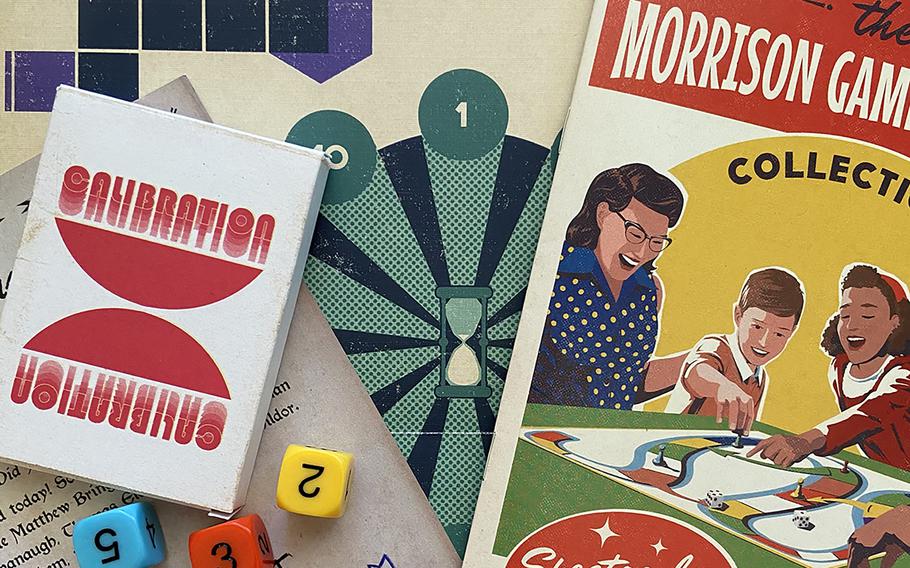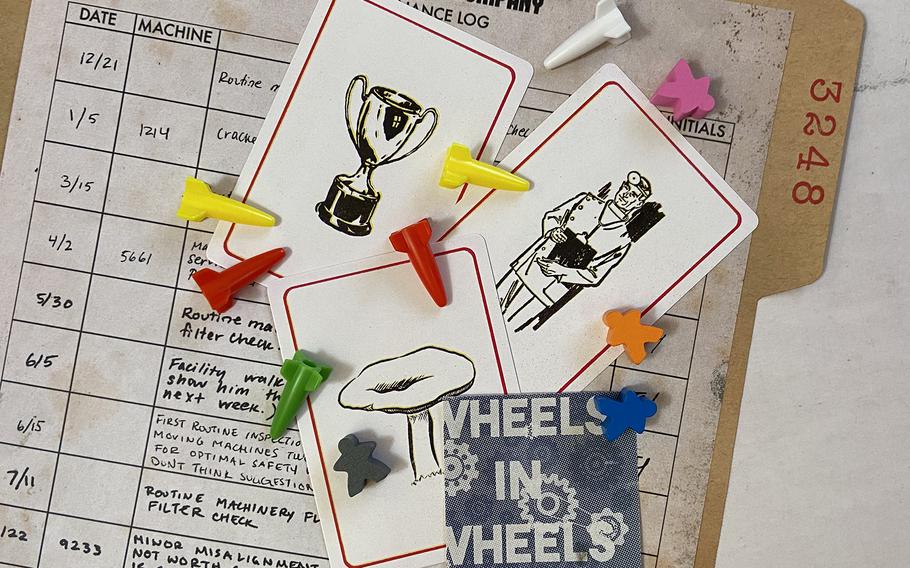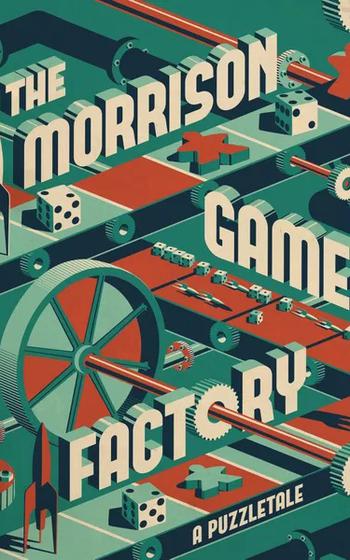
The Morrison Game Factory is a constant act of discovery set at a now-defunct game warehouse. (PostCurious/TNS)
I knew The Morrison Game Factory had its hooks in me when I started talking back to it. There I was, alone and at home, and in conversation with a fictional machine.
Puzzles were sprawled around me. Colorful dice, a small board, little plastic rocket ships and a stack of cards with seemingly disconnected drawings on them — a golfer, a mushroom, a diver and more. I was about two hours into Lauren Bello's puzzle game, but I was devouring it more as a story. That's because The Morrison Game Factory unfolds as an interactive narrative, one in which each challenge unlocks another mini-chapter in a tale of friendship, loneliness and even grief.
There were some moments the puzzles stumped me. I used the hint system on one involving numbers. But more often I found myself pausing to reflect — affected by a touching phrase. An example: "I like that, that talking to me isn't work for him," an observation about what it feels like to be in true conversation and connection with someone. It certainly wasn't what I was expecting when I opened a bewitching, vintage-tinged box detailing a fantastical assembly line and saw a smattering of board game figurines. Later, I felt an urgency to complete the game, especially once the relationship at its core is severed.
That's when I wanted to communicate with the main character of The Morrison Game Factory. I sat, caught in contemplation, mulling over moments in my life in which I've had to navigate separation and heartbreak. Such is the power of Bello's tabletop puzzle tale. There was no time to dwell, however. In seconds I was back at it, arranging little wooden people — meeples, as they're known — around a pinwheel with numbers at the end of each spoke. There were puzzles to solve, and a story of loneliness to cure.
Bello's The Morrison Game Factory was one of the best narratives I encountered — or played — this summer. Bello, an L.A.-based television writer who has written for such series as "Foundation" and "The Sandman," began crafting the game for friends during the worst days of the pandemic. It's a love letter to play as a form of communication, a treatise on how games can connect us and enable vulnerability in our relationships. It's also a hopeful statement, one of moving on with gratefulness rather than sadness, and how every day can be full of a new playful discovery.

Lauren Bello began crafting The Morrison Game Factory for friends during the worst days of the pandemic. (Lauren Bello/TNS)
"I think grief can feel so sharp that you can't look at it directly or else you'll be blinded," Bello, 36, says. "Games, and fiction and other forms of media can be a way to process your grief and your overwhelming feelings in the background without forcing you to look at it directly. If they're done well, you kind of realize you and your grief are standing side by side and hand in hand, and you realize, 'Now I can turn to face you.'"
To explore The Morrison Game Factory is a delight. The conceit: We are handed a box of stray board game pieces, all of them, we're told, rescued from an abandoned game factory and seemingly connected. The game is a constant act of discovery — maintenance logs will lead us to a website, where we'll get to know the characters who once worked at the now-defunct game warehouse. We'll be tasked to look at crossroad puzzles in unexpected ways, to piece together visual obstacles, construct actual puzzles and partake in one task that feels like a mini science experiment.
We're given numbers to call, and at times we'll read the deeply intimate thoughts of the main character, which we learn via the opening puzzle is a machine that has been able to gain the gifts of human thought and compassion. The slight sci-fi bent came naturally to Bello.
"I'm definitely drawn to genre," Bello says. "I feel like the world is changing very quickly — the way that people speak, the way that people act, the things people have access to. Genre is a fun way to say what you have to say while also inoculating against the effects of time."

The Morrison Game Factory. (PostCurious/TNS)
What would become The Morrison Game Factory started as a holiday exchange for a puzzle enthusiast Facebook group. Bello's game attracted attention, and eventually it reached Rita Orlov, whose Bay Area company, PostCurious, would go on to publish the title. "When I played it, I was most enamored with the range of emotions I felt while experiencing the narrative — it made me laugh, it made me feel sadness and empathy, and it really made me care for the main character, all of which feels like a rarity in tabletop games," Orlov says.
The Morrison Game Factory reorients us to look for a story more than a solution, meaning at times we may make the puzzle more difficult than it actually is. I played solo, although up to three is recommended, and at times I wished I had someone to bounce ideas off of. That's because sometimes the answer is simply hiding in a catalog description. In that sense, working out what the puzzles are asking us to do is occasionally more of a challenge than the actual puzzle, but the underlying narrative drive helps create a sense of urgency.
Bello says writing television helped her create the framework for the game, especially when it came to building tension.
"I think that Morrison Game Factory naturally fell into three acts," Bello says. "My experience in writing other kinds of stories told me what those acts were. Also, good stories control a flow of energy. They have a very intentional sense of momentum. I tried in the game to start off with it easy and an expected momentum, and then ramp up the energy. By the third act, you feel, 'I'm on a roll. I'm on fire.' The puzzles get a little shorter, and you start feeling like everything that came before is now coming together. That's a skill set I learned from other writing."

()
Still, the fact that the game is reaching a wider audience now has Bello rethinking some of her approach. The Morrison Game Factory started with a Kickstarter and quickly exceeded its $30,000 goal in just a few hours (PostCurious has a dedicated following in the tabletop arena for its narrative-focused games, notably the tarot-inspired The Light in the Mist). Reviews beyond the board-game world, in the escape room and immersive communities, have been positive and have praised the title as an approachable and emotional story-first game, with some even asking if it's possible for a board game to make you cry.
"The magic trick of The Morrison Game Factory is that you aren't thinking about the puzzles. You want to solve them not for the sake of the puzzles themselves but for the sake of the character and the story," says Lisa Spira, co-founder of Room Escape Artist, a site dedicated to the escape room sector.
And Bello wonders today if the opening puzzle — a cipher challenge — can overwhelm some of those new to the space. "I try not to waste people's time unnecessarily," she says. "Sometimes it's easy to turn things into a puzzle. I always try to be more experience-focused. Like, is this going to enhance your experience to have this puzzle? is there going to be an 'aha moment' or a moment of delight, or is it going to lead to, 'Oh great, now I have to put a lot of work into this puzzle?'"
And yet the game is relatively forgiving. When we're led to the accompanying website, a robust hint system delicately gives away the solutions. The goal here is joy — games as a dialogue, which comes through as we emotionally heal the story's protagonist.
"I played a lot of games with my family and I loved the way that games could become a shorthand for things," Bello says. "I loved when one person could lay down a piece and everyone would go, 'Ohhh.' You immediately knew what they were doing. It was a whole unspoken language behind the movement of the pieces. You could be expressing allegiance with someone, or standing up to someone, and it was this other world of language."
To experience The Morrison Game Factory is essentially to have a conversation, one in which we learn a dialect centered on play. And it turns out it's a vernacular that's adept at far more than offering a challenge.
"At the end of the day," Bello says, "it's used to express love. That's what it is for me."